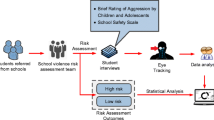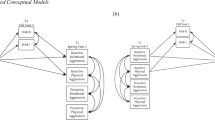Abstract
This discussion summarizes some of the key conceptual and methodological contributions of the four articles in this special section on social information processing (SIP) and aggression. One major contribution involves the new methodological tools these studies provide for future researchers. Eye-tracking and mood induction techniques will make it possible for SIP researchers to study attentional and emotion-related processes across the six SIP steps. In addition, the STEP-P instrument will open up the study of emotionally-charged aspects of preschoolers’ early SIP. A second contribution is how these articles emphasize the dynamic interplay of emotional and cognitive processes in the emergence of children’s and adolescents’ aggressive tendencies. Finally, implicit developmental themes are raised by several of these studies. Discussion concludes with suggestions for future research, including a focus on the positive (i.e., non-disruptive) role of emotions, and on the connections between moral development and aggression.

Similar content being viewed by others
References
Arsenio, W., & Lemerise, E. (2010). Emotions, aggression, and moral development: Bridging development and psychopathology. Washington: American Psychological Association.
Arsenio, W., Adams, E., & Gold, J. (2009). Social information processing, moral reasoning, and emotion attributions: Relations with adolescents’ reactive and proactive aggression. Child Development, 80, 1739–1755.
Crick, N., & Dodge, K. (1994). A review and reformulation of social information-processing mechanisms in children’s social adjustment. Psychological Bulletin, 115(1), 74–101.
Denham, S. (1998). Emotional development in young children. New York: Guilford.
de Castro, B. O. (2010). Rage, revenge, and precious pride: Emotions in information processing by children with aggressive behavior problems. In W. Arsenio & E. Lemerise (Eds.), Emotions, aggression, and moral development: Bridging development and psychopathology. Washington: American Psychological Association.
Dodge, K., & Somberg, D. (1987). Hostile attribution biases among aggressive boys are exacerbated under conditions of threat to the self. Child Development, 58, 213–224.
Fontaine, R., Tanha, M., Yang, C., Dodge, K., Bates, J., & Pettit, G. (2010). Does response evaluation and decision (RED) mediate the relation between hostile attributional style and antisocial behavior in adolescence? Journal of Abnormal Child Psychology. doi:10.1007/s10802-010-9397-y.
Fredrickson, B., Cohn, M., Coffey, K., Pek, J., & Finkel, S. (2008). Open hearts build lives: positive emotions induced through loving-kindness meditation, build consequential personal resource. Journal of Personality and Social Psychology, 95(5), 1045–1063.
Gladwell, M. (2005). Blink: The power of thinking without thinking. New York: Little, Brown, and Company.
Harper, B., Lemerise, E., & Caverly, S. (2010). The effect of induced mood on children’s social information processing: Goal clarification and response decision. Journal of Abnormal Child Psychology.
Horsley, T., de Castro, B. O., & Van der Schoot, M. (2010). In the eye of the beholder: Eye-tracking assessment of social information processing in aggressive behavior. Journal of Abnormal Child Psychology.
Hyde, L., Shaw, D., & Moilanen, K, (in press). Developmental precursors of moral disengagement and the role of moral disengagement in the development of antisocial behavior. Journal of Abnormal Child Psychology.
Lazarus, R. (1984). On the primacy of cognition. American Psychologist, 39, 124–129.
Lemerise, E., & Arsenio, W. (2000). An integrated model of emotion processes and cognition in social information processing. Child Development, 71, 107–118.
Lemerise, E., & Maulden, J. (2010). Emotions and social information processing: Implication for understanding aggressive (and non-aggressive children). In W. Arsenio & E. Lemerise (Eds.), Emotions, aggression, and moral development: Bridging development and psychopathology. Washington: American Psychological Association.
NICHD Early Child Care Research Network. (2004). Trajectories of physical aggression from toddlerhood to middle childhood. Monographs of the Society for Research in Child Development. 69(4, Serial No. 278).
Oatley, K., Keltner, D., & Jenkins, J. (2006). Understanding emotions (2nd ed.). Malden: Blackwell.
Powell, N., Lochman, J., Boxmeyer, C., Barry, T., & Young, L. (2010). The Coping Power Program for anger and aggression in children: Targeting arousal and cognition. In W. Arsenio & E. Lemerise (Eds.), Emotions, aggression, and moral development: Bridging development and psychopathology. Washington: American Psychological Association.
Schultz, D., Izard, C., & Ackerman, B. (2000). Children’s anger attribution bias: Relations to family environment and social adjustment. Social Development, 9, 284–301.
Schultz, D., Ambike, A., Logie, S. K., Bohner, K. E., Stapleton, L. M., VanderWalde, H., et al. (2010). Assessment of social information processing in early childhood. Journal of Abnormal Child Psychology.
Zajonc, R. (1984). On the primacy of affect. American Psychologist, 39, 117–123.
Author information
Authors and Affiliations
Corresponding author
Rights and permissions
About this article
Cite this article
Arsenio, W.F. Social Information Processing, Emotions, and Aggression: Conceptual and Methodological Contributions of the Special Section Articles. J Abnorm Child Psychol 38, 627–632 (2010). https://doi.org/10.1007/s10802-010-9408-z
Published:
Issue Date:
DOI: https://doi.org/10.1007/s10802-010-9408-z




